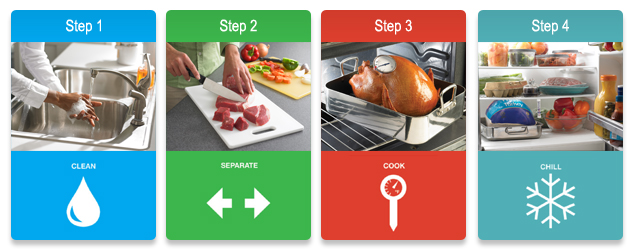Barbecue and Food Safety Tips

Source: Food and Drug Administration
With barbecue season fast approaching and the theme of this year’s World Health Day being food safety, we want to help you avoid food contamination at your next cookout!
According to the World Health Organization, over 200 diseases are caused by food and drinking water that has been contaminated with harmful bacteria, parasites and viruses. It is estimated that around 2 million people die annually as a result of food-borne illnesses.
Here are some important food safety precautions you can take when grilling, or just cooking in general, to help you avoid food contamination:
Clean Hands
This one is obvious. Make sure you wash your hands before you prepare, eat or do anything with food!
Keep Meat and Poultry Separate
Keeping meat and poultry separate from each other, and from other foods is very important. This is done to avoid cross-contamination. This can happen when the juices from raw meat or poultry drip onto or come in contact with other foods. Therefore if possible it’s a good idea to keep raw meats poultry and other foods in separate plastic bags and coolers when preparing for your barbecue.
Don’t Mix Utensils or Platters
If you like to do your grilling in the great outdoors, access to clean water or washing facilities may not be an option. Therefore, it’s important that you bring plenty of utensils and platters with you. This will ensure you don’t use mix utensils or platters used for raw foods with those used for cooked foods. A nicely cooked steak on a plate of raw chicken juice is a recipe for disaster!
Make Sure Foods Are Cooked and Stored At The Right Temperatures
Food temperatures are important for several reasons. One reason is to make sure food is cooked to a safe minimal internal temperature, killing harmful bacteria, and is safe to eat. This can be done by using a thermometer to check if your food is at a safe minimal internal temperature (See safe temperature guide at the end of this post), a particularly good idea if you like to Pit Roast or Smoke your meats, as these methods take a lot longer than grilling to cook the meat.
Another reason temperature is important, is to avoid harmful bacterias thriving. For example, leaving your raw chicken next to the barbecue in the sun – not a good idea! A good way to remember this is to :
Keep Hot Food Hot – Keep cooked meats hot until served.
Keep Cold Foods Cold - Keep uncooked meats refrigerated until ready to use, only remove when food it is going to be placed directly on the grill.
Make sure leftovers are quickly refrigerated. If they have been sitting for over two hours (1 hour if it’s a hot day) discard immediately.
Avoid Charring Your Food
It has been suggested that there may be a cancer risk to humans as a result of eating meats cooked at high temperatures. However, no definitive link has yet been found. According to the United States Department of Agriculture “eating moderate amounts of grilled meats like fish, meat, and poultry cooked — without charring — to a safe temperature does not pose a problem”.
Safe Minimal Internal Temperatures
Below are the temperatures the USDA recommends as ‘safe internal temperatures’ for cooked meats:
Whole poultry: 165 °F
Poultry breasts: 165 °F
Ground poultry: 165 °F
Ground meats: 160 °F
Beef, pork, lamb, and veal (steaks, roasts and chops): 145 °F and allow to rest at least 3 minutes.
For an extensive overview of food safety, check out the The USDA’s website they have a bunch of useful information on food safety.
Happy coooking!